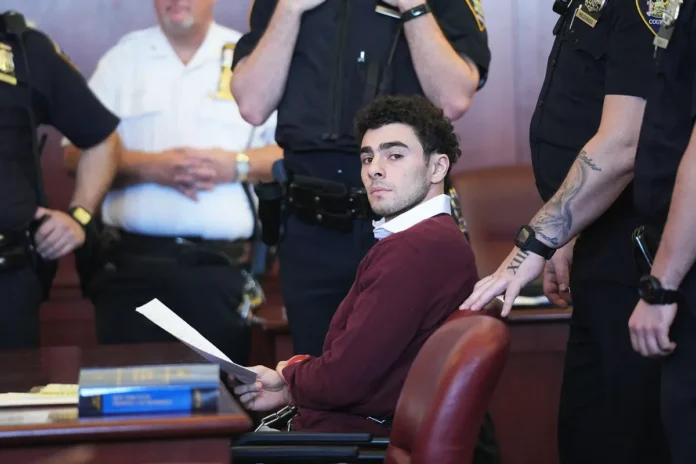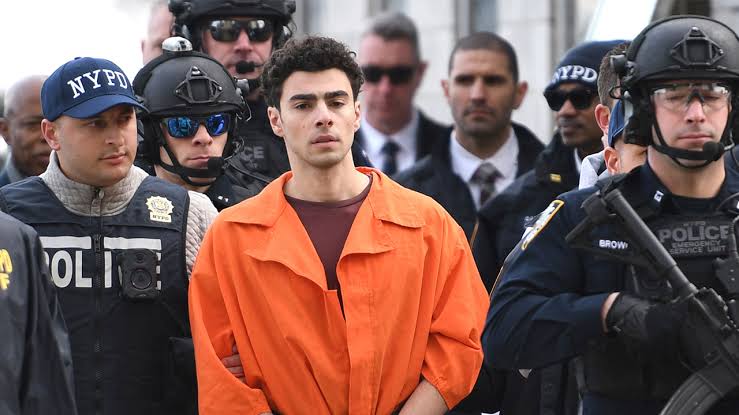While the shooting of United Healthcare CEO Brian Thompson has sparked a public discussion around America’s private healthcare industry and political violence, one of the charges against the alleged shooter, Luigi Mangione, has sparked a legal debate over whether his alleged actions constitute “terrorism” and what the effect of the special treatment officials are giving the case will have on a potential trial.
The Manhattan District Attorney’s office earlier this month hit Mangione with 11 charges, including murder in the first degree in the furtherance of terrorism, a charge that has been scrutinized by many in the legal community.
Barbara McQuade, a former federal prosecutor for the Eastern District of Michigan, told Salon that the terrorism charge fits the state’s definition of terrorism. In New York, a crime is considered terrorism if it is done “with intent to intimidate or coerce a civilian population, influence the policy of a unit of government by intimidation or coercion or affect the conduct of a unit of government by murder, assassination or kidnapping.”
In McQuade’s view, Mangione’s alleged assassination of Thompson qualifies as an action made with “intent to intimidate or coerce a civilian population.” She cited that the shooter “put the words on the bullets” and the materials found with Mangione at the time of his arrest as evidence that he allegedly sought to intimidate those at the helm of the healthcare industry.
“This case is really more than just a garden variety murder case,” McQuade said. “I think I agree with the charging decision here in that it is political violence and that, in order to deter political violence, we need to send a message that this is above and beyond garden variety murder.”
Javed Ali, a law professor at the University of Michigan, agreed with McQuade and noted that the shooting is being treated as an act of terror by New York officials in more ways than just the charges. Ali pointed to the Mangione’s perp walk, where he was surrounded by heavily armed law enforcement as well as Mayor Eric Adams. He said it bore similarities to the perp walk of Timothy McVeigh, the Oklahoma City bomber, who killed 168 people in 1995.
Ali said that the perp walk demonstrates that New York officials are giving the shooting special weight, though he noted that the terror charge could be dropped as the trial approaches if prosecutors feel it might be hard to prove.
The special attention Mangione’s case is receiving from law enforcement officials, however, is part of what some lawyers are scrutinizing about the handling of the shooting.
Former federal prosecutor Neama Rahmani told Salon that he sees the terrorism charge as a “stretch” and says that he thinks the decision to charge Mangione with an act of terror moves the focus of the case from Thompson’s killing onto the health insurance industry in America.
“Terrorism requires either the intent to intimidate the public or to influence the government,” Rahmani said. “Now all of a sudden, the health insurance industry and his motivation all come into evidence in what would otherwise be a pretty clear murder case.”
Unlike other New York cases where terrorism has been alleged, like the white supremacist shooting at a Tops supermarket in 2022, there is widespread public support for Mangione and the unusual treatment that his case is receiving, Rahmani said, might only make it harder for prosecutors to win in court
“It’s atypical—the way the whole case has been handled. You have Eric Adams, who is under indictment himself, at the perp walk,” Rahmani said. “I see a very real risk of jury nullification in the case. I haven’t seen something like this since OJ, where there is so much sympathy for the accused.”
Jeremy Saland, a criminal defense lawyer and former Manhattan prosecutor, agreed that the charge was a “stretch” and “offensive.”
“I don’t recall the Southern District swooping in or Mayor Adams coming in for any time a domestic abuser crosses state lines,” Saland said. “Unless you’re going to stand behind victims of domestic violence with the same voice.”
He said the charge was offensive for two reasons: First, it sends a message to the families of victims of more mundane murders that the state and city see Thompson’s murder as far more important than others. Secondly, he said that delving into the alleged political motivations of the shooting has shifted the focus of the case.
“All of this has become about Mangione and you forgetting about Thompson,” Saland said. “This does no justice to Brian Thompson and no justice to the criminal justice system. This does no justice to the victims of ‘regular’ murders.”
One other possibility, suggested by Ali, is that prosecutors brought the terrorism charge against Mangione in the hopes of getting him to agree to a plea deal, which could include an agreement to drop the first-degree murder charge and get him to plead guilty to second-degree murder, which he is also charged with.
Ali also noted that the sequencing of the state and federal cases against Mangione could influence one another. In federal court, Mangione is charged with using a firearm to commit murder and stalking. The former of those charges could result in the death penalty, a punishment the incoming Trump administration is expected to use liberally. Because of this, Mangione’s state-level case might not even go forward if his federal trial happens first, Ali said.
















